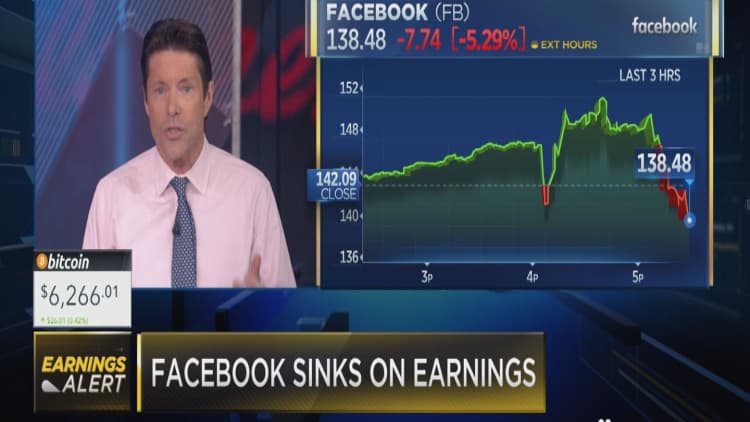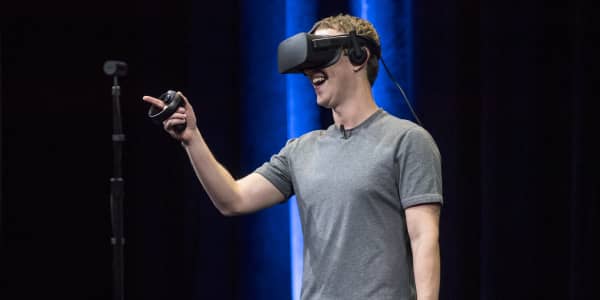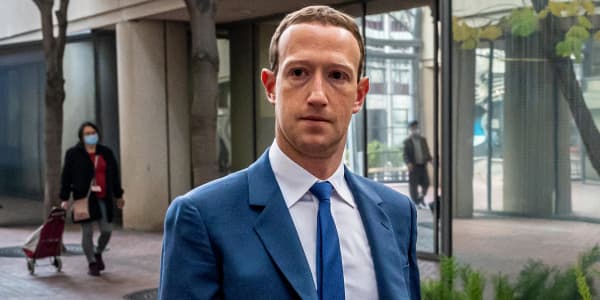Mark Zuckerberg on Tuesday laid out his vision for the future of Facebook by highlighting three priorities: video, messaging and Stories.
The Facebook CEO used his quarterly earnings call to highlight that these three areas are critical to the future of the social media company and to explain the unique challenges each one faces.
Stories 'will be bigger' than News Feed
"I just think that this is the future," Zuckerberg said when talking about the Stories feature that Facebook copied from Snapchat and introduced across its numerous apps. With Stories, users share full-screen photos or videos with their friends or followers that disappear after a day, rather than sticking around permanently.
"People want to share in ways that don't stick around permanently, and I want to make sure that we fully embrace this," Zuckerberg said.
While Stories have been a hit on certain Facebook apps like Instagram, the feature has been adopted more slowly on the main Facebook app. Regardless, Zuckerberg said he believes the opportunity with Stories "will be bigger" than that of News Feed, the scrolling wall of posts from friends that has dominated most Facebook users' experience for years.
Facebook is still trying to figure out how to monetize Stories. Zuckerberg and Chief Operating Officer Sheryl Sandberg explained that the company's ad products for stories are not yet as robust as Facebook's older ad products. The company will need to build out these tools as well as train advertisers on the best way to create ads for Stories, Sandberg said. Thus, it remains unclear when ad revenue for Stories will converge with the revenue from feed ads, Zuckerberg said.
"I can't tell you just yet what that time frame is going to look like, but I think we're well positioned over the long term because we're leading in Stories and in basically every country," he said.
Messaging: Speed is the key
People now send about 100 billion messages each day across its services as people shift more of their interactions with one another into private conversations on WhatsApp and Messenger, Zuckerberg said.
Facebook's biggest competitor when it comes to private messages is Apple's iMessage, Zuckerberg said. The company plans to improve its two messaging apps by making them easier to use, faster, adding payment features and continuing to improve their security.
"We found that every time we make our services faster and simpler, people communicate more," he said.
But the company still faces challenges figuring out how to make money from the apps. "It's still early," Sandberg said, explaining that the company is exploring how to help businesses reach users through Messenger and WhatsApp through paid messages.
Video
Facebook has been focusing its attention on video for a few years now, but since August 2017, the company introduced two stand-alone video products: Facebook Watch and IGTV.
"Over the last few years … people were consuming more public content, like passive video consumption and news. But it was coming at the expense of people interacting with each other as much," Zuckerberg said on the call.
With Watch and IGTV, Facebook is creating services that allow the company to maintain video channels without dissuading people from sharing their own material on their News Feeds or in Stories. Zuckerberg said these products are "growing very quickly."
Unfortunately, stand-alone video "monetizes significantly less well per minute than people interacting in feeds," Zuckerberg said. Facebook could make more money from video by emphasizing it in its social products, but the company believes separating it out is the right thing to do.
"Video is a critical part of the future," Zuckerberg said. "It's what our community wants, and as long as we can make it social, I think will end up being a large part of our business as well."






